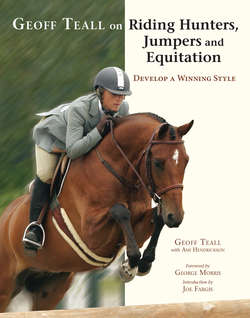Читать книгу Geoff Teall on Riding Hunters, Jumpers and Equitation - Geoff Teall - Страница 27
На сайте Литреса книга снята с продажи.
Stay Cool
ОглавлениеLack of emotion is the key to seeing beyond symptoms to the underlying cause of a problem.
When trying to get to the bottom of something, choose a moment when you are not emotionally involved with what is going wrong. Don’t hesitate to talk with someone who is educated and uninvolved (or at least less invested in the problem than you are). Ask questions. Don’t be too proud to ask for help to find your solution.
Keeping a cool head is a component of a balanced approach. When talking about the art of equitation, a basic assumption is that you do not allow negative emotions to color your riding.
We have all seen it: for some reason, be it a lack of training, bad footing, or sloppy riding, a horse performs poorly and the rider takes it personally. As the rider rants, the horse invariably reacts negatively—and the drama escalates.
Anytime emotion enters into your schooling or training program, you inevitably make errors in judgment. If you allow emotions to affect your actions, your horse is the one who suffers.
If you ever find yourself feeling angry or upset, or if you feel the urge to strong-arm your horse and ride roughly, stop. Quit whatever it is you’re doing. Clear your head. Take a break. You might even need to dismount and put the horse away.
Don’t allow riding to get to be “Too Much.” It should never put so much pressure on you or have so much significance that it is no longer enjoyable. If you feel that your riding has crossed the “Too Much” line, stop and do something else. Give yourself a chance to settle down before you try again.
Horses do not understand emotional reactions, but they have incredible memories. Distance yourself from the situation if your emotional state makes it necessary. Then come back and try again when you are in better control of yourself.
